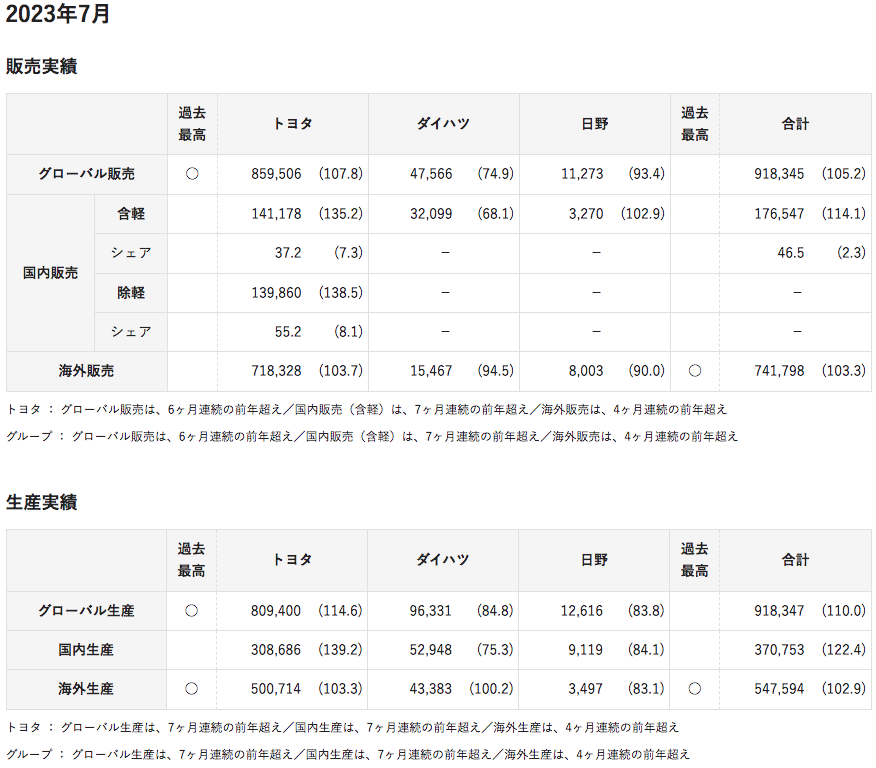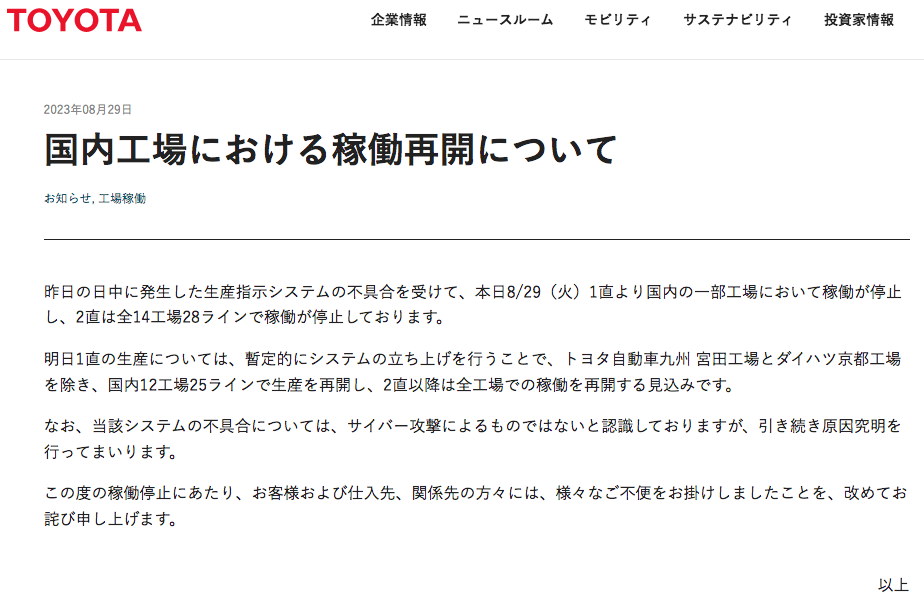In addition to Weibo, there is also WeChat
Please pay attention

WeChat public account
AutoBeta


2024-11-22 Update From: AutoBeta autobeta NAV: AutoBeta > News >
Share
AutoBeta(AutoBeta.net)09/03 Report--
On August 30, Toyota Motor Group released the global production and marketing report for July 2023. Data show that in July 2023, Toyota's global sales were 859500 vehicles, up 7.82 percent from the same period last year, the sixth consecutive month of year-on-year growth; production was 809400 vehicles, up 14.56 percent year-on-year, seven consecutive months of year-on-year growth.
According to the data, Toyota achieved growth in both sales and production in July. Toyota said that due to semiconductor supply problems and the relief of COVID-19, sales and production in July 2023 exceeded the same period a year earlier. In terms of production, Toyota's domestic market in Japan rose 39.16% year-on-year to 308700 vehicles in July 2023, while overseas markets grew 3.2% to 500700 vehicles. Regionally, North America grew by 3 per cent, Thailand by 19 per cent and India by about 2.8 per cent.

In terms of sales volume, also in terms of market segments, Toyota's domestic market sales in Japan rose 35.19% year-on-year to 141200 vehicles in July 2023, while overseas markets grew 3.69% to 718300 vehicles. In addition, regionally, the European market grew by 18%, and the Philippines in Asia grew by 19%. It should be noted that Toyota's sales in China fell 15.4% from a year earlier.
Toyota sold 152700 vehicles in China in July, down 15.4 per cent from a year earlier, according to data. Of course, Toyota China is not the only Japanese brand whose sales have declined, including Honda China and Nissan China, with Honda China sales down 32.8% year-on-year to 89600 vehicles and Nissan China down 43.61% to 59500 vehicles. As for the reasons for the decline in sales, the decline in sales of Japanese brands in China is attributed to "fuel cars are difficult to sell and electric cars are not popular". For the current Japanese brands, the era of relying on "performance-to-price ratio" has passed, whether it is Toyota China or Honda China, it is urgent to complete the transition to a new energy market as soon as possible.

Of course, this is later, back to the topic of Toyota. Toyota's global production has been hit hard since 2019 by a shortage of semiconductors and parts caused by the spread of COVID-19 's epidemic. Toyota's global production fell to 7.9 million vehicles in 2020, while global production returned to 9.02 million last year, but it is still nearly 30, 000 below the new record set in 2019, according to the data.
At the beginning of this year, Toyota said it expected to produce about 9.5 million-10.6 million vehicles in 2023 (natural year). Due to global chip shortages, Toyota's production situation was uncertain, and Toyota pointed out that final production could be cut by 10%. However, while benefiting from semiconductor supply problems and the relief of COVID-19, Toyota had informed its major parts suppliers of its latest production targets as of August 29. Toyota has set the global production of the "Toyota and Lexus" brand at 10.2 million vehicles in 2023, which will be 10% more than in 2022, and if nothing happens, it will significantly set a record high of 9.05 million vehicles in 2019.

On Aug. 29, Toyota suspended operations of a total of 28 production lines at all factories in Japan because of suspected system failure. The plant was closed because Toyota failed to update its parts ordering system, but the failure was limited to local factories, according to people familiar with the matter. Toyota later said on its website that the system failure was not caused by a cyber attack, but would continue to find out the detailed cause, although Toyota did not specify the models affected at the time. Fortunately, the plant was shut down for only one day, and all Toyota plants in its Japanese home market resumed operations on Aug. 30.
It is understood that Japanese factories account for about 1/3 of Toyota's annual output, and the shutdown of all factories in Japan will delay production of about 13000 vehicles a day, equivalent to 4 to 5 per cent of Toyota's monthly production capacity in Japan. However, it is not clear whether the one-day suspension of all vehicle factories in Japan will affect the 2023 (natural year) production target.

According to Toyota's medium-term production plan, Toyota expects to produce about 10.7 million vehicles worldwide next year and about 11 million by 2025, of which production in Japan's domestic market will gradually rise to more than 3.5 million by 2025.
Welcome to subscribe to the WeChat public account "Automotive Industry Focus" to get the first-hand insider information on the automotive industry and talk about things in the automotive circle. Welcome to break the news! WeChat ID autoWechat
Views: 0
*The comments in the above article only represent the author's personal views and do not represent the views and positions of this website. If you have more insights, please feel free to contribute and share.











© 2024 AutoBeta.Net Tiger Media Company. All rights reserved.